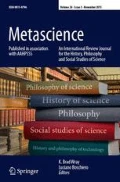Notes
My reference with a number sign and two numerals are to letter number, Book, and page number in de Beer’s edition of Locke’s correspondence (Locke 1976–1989). References with three arabic numerals are to Nidditch’s edition of Locke’s Essay (Locke 1975) and references of two numerals after ‘NO’ are to Book and Aphorism of Bacon’s New Organon. I am grateful to Martin Curd for helpful comments.
A related niggle: Anstey, following William Newman and Lawrence Principe, calls seventeenth-century chemistry ‘chymestry,’ in order to highlight its continuity with seventeenth-century alchemy. Given the continuity in methods and subject matter between seventeenth-century chemistry and recent work in the field, they could save themselves some fussiness by just calling the relevant disciplines ‘chemistry.’ If Boyle could call himself a ‘chemist,’ we can call him that, too.
References
Aaron, Richard. 1938. The limits of Locke’s rationalism. In Seventeenth century studies presented to Sir Herbert Grierson, 292–310. Oxford: Clarendon Press.
Bacon, Francis. 2004. The Instauratio magna Part II: Novum organum and associated texts. In The Oxford Francis Bacon, ed. & trans. G. Rees and M. Wakely. vol. 11. Oxford: Clarendon Press.
Bennett, Jonathan. 1984. A study of Spinoza’s Ethics. Indianapolis: Hackett Publishing Co.
Boyle, Robert. 1661. The sceptical chymist. London.
Carson, Emily. 2005. Locke on simple and mixed modes. Locke Studies 5: 19–38.
Locke, John. 1823. The works of John Locke, 10 vols. London: Thomas Tegg.
Locke, John. 1975. An essay concerning human understanding, ed. Peter H. Nidditch. Oxford: Clarendon Press.
Locke, John. 1976–1989. The correspondence of John Locke, 8 vols., ed. E. S. de Beer. Oxford: Oxford University Press.
Locke, John. 1990. Drafts for the Essay concerning human understanding and other philosophical writings, 3 vols., ed. Peter H. Nidditch and G.A.J. Rogers. Oxford: Clarendon Press.
Moravcsik, Michael. 1980. How to grow science. New York: Universe Books.
Roth, Leon. 1935. Note on the relationship between Locke and Descartes. Mind 44: 414–416.
Schankula, H.A.S. 1980. Locke, Descartes, and the science of nature. Journal of the History of Ideas 41: 459–477.
Stillingfleet, Edward. 1697. A vindication of the doctrine of the trinity. London: Henry Mortlock.
Woolhouse, Roger. 2005. Locke and the nature of matter. In Early modern philosophy: Mind, matter and metaphysics, ed. Christia Mercer and Eileen O’Neill, 142–160. New York: Oxford University Press.
Author information
Authors and Affiliations
Corresponding author
Rights and permissions
About this article
Cite this article
Stuart, M., Campbell, K., Jacovides, M. et al. Locke’s experimental philosophy. Metascience 22, 1–22 (2013). https://doi.org/10.1007/s11016-012-9701-2
Published:
Issue Date:
DOI: https://doi.org/10.1007/s11016-012-9701-2

